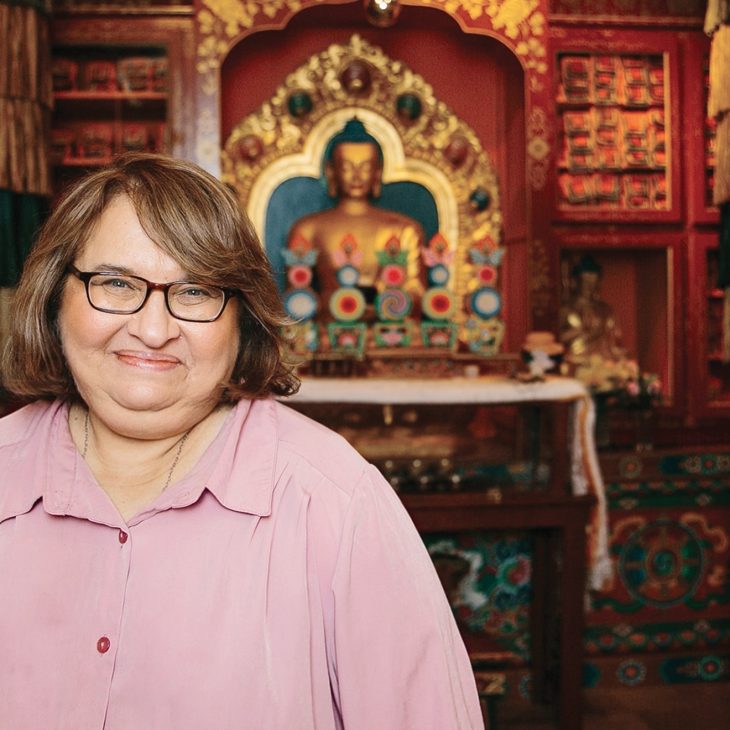Ps. 133: A Buddhist Perspective
June 15, 2020

As one of the first to bring meditation and mindfulness into mainstream American culture over 45 years ago, Sharon’s relatable, demystifying approach has inspired generations of practitioners. She is co-founder of The Insight Meditation Society in Barre, MA, and the author of eleven books, including the New York Times bestseller, Real Happiness, now in its second edition, her seminal work, Lovingkindness, and her newest book, Real Change: Mindfulness To Heal Ourselves and the World (September 2020, Flatiron Books).
-Psalm 133:1 “How good and pleasant it is when brothers and sisters dwell together in unity.”
The opening line of this psalm calls to mind Buddhist teachings on lovingkindness. The premise of lovingkindness is that we can recognize our interconnection, believe that everybody counts, everybody matters, without necessarily liking someone or approving of them. The cultivation of lovingkindness leads to a bone deep realization that our lives have something to do with one another, that the constructs of self and other and us and them, while useful in certain ways, are just constructs. The deeper reality is “we.” Many of us think of lovingkindness as a kind of weakness: sentimental, conflict avoidant, sort of meek. But actually, it is a tremendous strength, more powerful than anger because it relies on a great truth of life: our lives are inextricably interwoven.
The most direct reflections said to deepen lovingkindness are: first, look for the good in someone (and that includes ourselves), even if it is a little sliver we can find in a morass of behavior and qualities to which we are averse. If we include it in our reflection, we won’t simply obsess about someone’s faults. We don’t deny these feelings, but we broaden our view beyond just them, reminding ourselves of the possibility of change. This could be akin to seeing everyone as one of God’s children.
The second reflection (and very handy when we can’t find anything good about someone), is to remember that everyone wants to be happy. Not in a superficial sense, but in a deeper sense: to have a feeling of belonging, a sense of being at home somewhere—in this body, in this mind, with one another, on this planet. If we can honor that wish to be happy that exists in everyone, we realize that it is ignorance that leads any of us astray, but that the urge is rightful, and we all share it.
The third reflection is a basis for deepening compassion, the flavor of lovingkindness that looks at suffering. It’s not that we all share the same measure of pain in this life, because clearly, we don’t. But we can reflect on the fact that we are all so vulnerable to loss, to change. Anyone’s life can change on a dime. Look at what has just happened to us. You could have given me a gazillion dollars in February, and I could not have predicted what June would look like. Realizing the vulnerability we share can help us establish a profound connection to one another. Then we can live together “as one” in peace.
One of the difficult tasks a meditation teacher of mine laid before me once was the guidance, every time I saw anger or fear or jealousy arise in my mind, to switch from calling it “bad” or “wrong” or “weak”, to calling it, “painful.” It was fascinating to see how, with that switch, my response to what I was feeling moved from rejection, disdain, or judgment, to compassion. It’s not always easy to remember moment to moment, but it is also unforgettable in its effect.
One of my common refrains in teaching is “we feel what we feel.” We can be so harsh in blaming ourselves for what we feel, but what I learned in my own practice and through my teachers is that we can learn instead to focus on what we do with those feelings. Do we take them to heart, and identify as though that was the only thing we will ever feel, or do we see them as what is happening right now? Do we feel isolated, or part of a human family that also sometimes feels these things? I learned that I couldn’t determine what I would feel, but I could work with what I did with it. And I learned the essence of that alternative way of relating was being kinder to myself. It doesn’t mean giving in and being overtaken by fear or lashing out in anger, it means having options in terms of how I behave; and that is empowering.
I’ve also learned that it’s important for me to look towards what I am grateful for, the good within me and in my life, the joy that also exists. It’s not a gesture of denial or avoidance, it’s just giving some airtime to that which might get overlooked or subsumed by the pain. Being able to take in the good actually fortifies us to face the pain without crumbling. It’s a cornerstone of resilience, of the inner sufficiency that changes the dynamic of how we react to whatever is happening. It’s what I think of when I think of the word “blessing” – not the eradication of all pain, or getting whatever we want, but the gift that allows me to be very different with the pain through an openness of heart, a sense of abundance, and the recognition that I’m never really alone.
Read more about PsalmSeason here and subscribe for email updates.
Share
Related Articles
Racial Equity
‘We’ve Been Here All Along’: Author Pushes Back Against Erasure Of Young Asian American Buddhists
American Civic Life
Interfaith Inspiration



